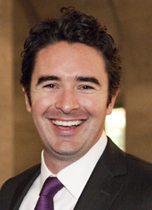 Want to know where asset management will be in a decade,
but don’t have time to read 40 pages of interviews? Well, you (a) should make
the time, because (b) it is well worth it. But if (a) and (b) aren’t immediate
possibilities, then there is option (c): have me pick out the clearest insights
into the future from this year’s Forty Under Forty.
Want to know where asset management will be in a decade,
but don’t have time to read 40 pages of interviews? Well, you (a) should make
the time, because (b) it is well worth it. But if (a) and (b) aren’t immediate
possibilities, then there is option (c): have me pick out the clearest insights
into the future from this year’s Forty Under Forty.
Reading through the (CIO-customized) Proust questionnaires given to each member, two trends dominate the group’s view of the future: the rise of technology, and the decline of active management and accessible alpha.
The year 2025 will be “much more reliant on computer models,” says Robbie Martin of the Superannuation Arrangements of the University of London. “They can crunch more numbers and make split-second investment decisions. Human intervention will still be required, but only at a high level.”
Komson Silapachai of the Teacher Retirement System of Texas believes that “we’ll see technology really permeate the market makers. We’ll be able to do more with fewer people. With that, the ecosystem will change, with more influence and power moving over to the institutions.” Others believe the institutional investing world will be “run by Silicon Valley” (Yang Song, Friends Life), “more quantitative” (Seth Kelly, Missouri State Employees’ Retirement System), and “run more by artificial intelligence and systematic trading,” (Noel Friel, ESB).
Nicolas Dang of the Canadian National Railway Pension Fund best links the technological line of thought with an outcome. A decade from now, he says, asset management will be “(a) mostly influenced by systematized/automated investment processes, and (b) enhanced by a broad selection of pre-manufactured and inexpensive risk premia, both on the long and short side.”
A significant number of the Forty Under Forty agree with Dang’s second point. The investment environment will be “more challenging and complex, especially as the asset base grows larger,” says Scott Pittman of the Mount Sinai Health System. “There will be greater competition and more difficulty in implementing active strategies. Passive strategies and factor replication will be more widely used as well.”
Jordan Rizzuto of IBM agrees, with a little sass thrown in: Institutional investing will be “similar to today but with fewer successful alpha managers,” he says. “And the industry will continue to have an unhealthy fixation on predicting the future.” Same with Peng Wang of the University of Virginia Investment Management Company, minus the sass: “I think there will be greater competition and it will be much harder to achieve alpha going forward.” Others agree: “More passive,” (Karianne Lancee, Univest Company), and “low priced beta and high priced alpha,” predicts Peter Lieu of the Abu Dhabi Retirement & Benefits Fund.
Of course, not everyone was willing to venture a guess. By dint of their youth, they’ll likely still be around in a decade to see if they were right or wrong. Asset management will be “too complicated for me,” says Denison University CIO Adele Gorrilla (easily the best-named member of the list). And the final—and perhaps wisest—word goes to Sarah Samuels of Massachusetts Pension Reserves Investment Management: “It’s a good question. If I could predict that, I could retire early!”
May you be so lucky, Sarah.
